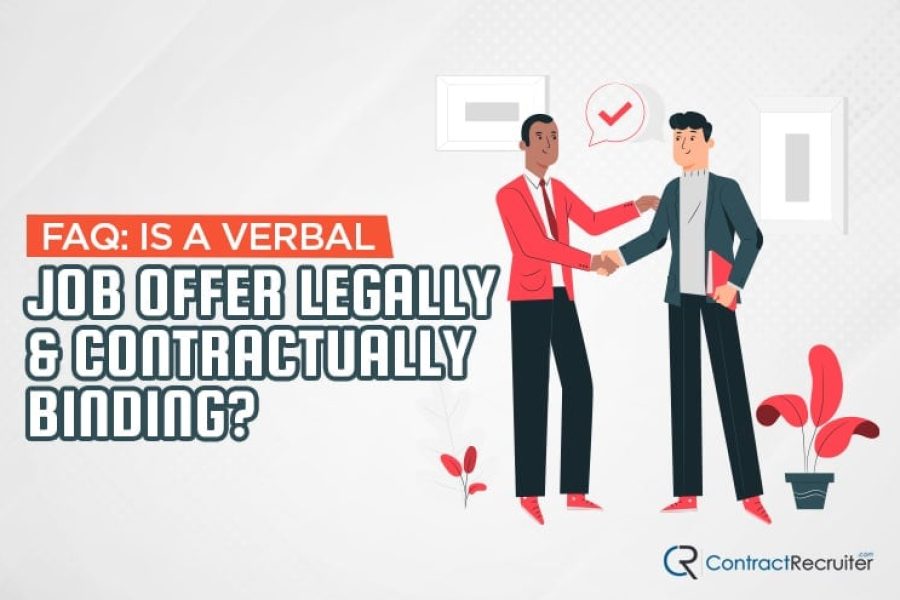

One of the most frequently asked questions involved in the job hunt is whether or not a verbal offer – and acceptance of that offer – forms a legally binding contract.
Imagine, if you will, this situation. You’re a hiring manager, and you’ve gone through the filtering and interview process to fill a role. You’ve identified a promising candidate. At the end of their final interview, you say that you would like to offer them the job and that you’ll send them the paperwork later. They agree, you shake hands, and the candidate leaves happy.
At this point, the candidate has not signed any paperwork. All they’ve done is acknowledged and accepted that you’ve extended the offer. Are they now officially employed? Are they obligated to sign the paperwork when it arrives?
This comes up a lot when candidates are applying to multiple jobs. They may be interviewing with several companies simultaneously, and they may even have more than one offer on the table to compare before deciding which one to accept.
Are they required to work for you now that you’ve extended this verbal offer and they’ve accepted it? Let’s examine the situation.
Learn About On Demand Recruiting Services
Did the Candidate Accept?
The first question you have to ask is whether or not the candidate accepted the offer.
Common advice from career and job-hunting sites regarding verbal offers is to “Show your appreciation, think it over, negotiate pay, request a written offer, and continue the job search.”
You’ll note that “accept the offer” is not one of the steps. Just because you extended the offer does not mean you are in a contract with the candidate.


If the candidate did not verbally accept the offer – and it has to be an explicit acceptance, not an implicit one – you have no contract. The candidate is free to do whatever they want with the offer, including ghosting you completely.
On the other hand, you have a verbal contract if the candidate explicitly accepts the offer (pending paperwork).
Are Verbal Contracts Binding?
The second question to ask is whether or not a verbal contract means anything.
In this case, the answer is relatively simple, but the devil is in the details.


Short version: yes, a verbal contract is legally binding. You must extend the written offer and the job when you make a verbal offer. When the candidate accepts that verbal offer, they must accept the job.
There are, however, a lot of little details that can change this equation.
Was the job offer conditional?
This question is a big one that many employers might overlook.


If you offer the candidate the job, but the offer is conditional based upon the results of some other verification, such as a drug test, a medical examination, a reference check, a credit check, or another set of conditions, then it’s not an actual job offer.
“The job offer must be unconditional. If the offer is made subject to certain conditions, like medical checkups or references, a final agreement is not formed until the set conditions are fulfilled. Mere acceptance of a conditional offer does not constitute a valid contract.” – UpCounsel.
In these cases, even if you offer a contract and the candidate accepts, there’s no actual contract in place because of the conditions. You will need to produce and provide a real contract once those conditions are fulfilled.
Was the verbal contract witnessed or recorded?
A verbal contract may be considered legally binding, but what happens if you have to take it to court? It becomes a matter of your word versus the word of the candidate. Maybe you claim they accepted, but they claim they never did, and they just thanked you for offering it.
Without a record, neither side can be proven. That can make it very difficult to prove one way or the other, and in these cases, the chances are pretty good that you won’t get anything out of the court proceedings.


That’s why more complex deals are usually offered in writing, including employment agreements. There are too many factors to keep track of with a verbal contract, and it’s too easy for some of them to slip through the cracks.
Does either party live in an at-will employment jurisdiction?
The biggest wrench in a verbal employment offer is that most people live and work in at-will employment jurisdictions.
“At will” means that either party, the employer or the employee, can sever the contract at any time. You can fire an employee for any reason, and the employee can also quit for any reason.


There are exceptions, of course.
- Public sector workers are generally not at-will.
- Unions can negotiate contracts that void at-will clauses.
- Employees are protected from being fired for particular actions, like refusing to violate the law in the course of their duties.
- Montana. Montana hasn’t passed at-will laws like virtually every other state.
Additionally, the employer cannot rescind the job offer if their reason for doing so ties into a protected class or protected information, such as learning at the last minute that the candidate belongs to a particular nationality or religion.
Why does this matter?
Well, in an at-will jurisdiction, even if the candidate accepts your verbal offer, they are free at any time to then sever the contract. That includes before a written offer is even signed.
At-will employment was broadly considered favorable to the employer when it was passed across the country, but that only held true while the employers held the power and employees were struggling to compete for jobs that often weren’t widely available. However, the labor market has shifted, and the pandemic has pushed the balance of power in favor of the employees, and now the leverage of at-will contracts swings in favor of the candidate. Many companies are discovering this first-hand, much to their chagrin.
“Employees are considered at-will unless the employer issues a contract of employment. An employment contract is a legally binding document that defines how long the employee is contracted at the business, and the employee’s compensation, responsibilities, and other job-related information. Employment contracts typically also include specific actions that would dissolve the contract.” – Top Echelon.
You can circumvent at-will employment by offering a solid, unconditional contract with stipulated terms, but that typically should be done in writing. While a verbal contract and a written contract ostensibly carry the same weight, a verbal contract is much harder to enforce without evidence. In some states, it can’t be enforced, no matter how much the law is on your side, due to the lack of records or evidence.
Did the offer change between the verbal offer and the written offer?
Let’s say that you present the candidate with a verbal offer, with attached compensation of $70k per year and a standard benefits package. They accept. Later, you realize that you can’t pay them that much. You send them the formal offer letter, and the compensation lists $60k per year instead. Where does the verbal contract come into play?


Often, an employer may think that the candidate is obligated to work for the newly given offer because they already agreed to work for the company. However, this isn’t true; the candidate agreed to the offer presented, including the offered compensation, so changing the terms of the agreement is a breach of contract. The candidate is free to accept the new offer, walk away, or even take you to court over the difference.
What If the Candidate Ghosts?
What happens if you extend a verbal offer, the candidate accepts, and then ghosts you? You send the paperwork, but it’s never returned. You call them, and they don’t pick up. Can you take them to court over the verbal agreement?
The answer is a tentative yes.
The question is, do you want to?
Yes, you’ve invested significant resources in the hiring process. You’ve spent time, and possibly money, on the specific candidate. That can include travel compensation, the salaries paid to hiring managers during the interviews, and even registration for training courses and other fees contingent on the candidate becoming an employee. This is all financial investment that you would then lose if the candidate ghosts you.
At the same time, none of this is the candidate’s responsibility. Your HR managers earn their salary regardless of whether or not they’re conducting that specific interview. You’d be paying for the training regardless of who signs the employment contract. Travel compensation and other specific-to-the-candidate expenses are just about the only unique costs that can be assigned to that individual and lost in the breach of a verbal contract.


You have the candidate’s information. You can, if you wish, take them to court over the breach of a verbal contract. If you do, though, what do you want to get out of it?
If you’re seeking reimbursement for the expenses invested in the candidate, you will need to have records of those expenses. A low bar, but not every company keeps those records.
You’re likely out of luck if you’re seeking the individual’s employment. At best, if they end up working for you, they will be resentful and unproductive. At worst, they’ll quit within days, leveraging the at-will nature of employment in the U.S. to their advantage. While a court might be able to order a mandatory duration for employment, you can bet that they’ll do the bare minimum and quit the moment they’re able to.
Moreover, all of this positions you as a company that is very dangerous to apply to, and that reputation won’t disappear. Why would others want to apply to you if they risk legal action? It’s a minefield they won’t want to walk through.
On top of all of this, you have to win in court, which means you have to convince the court that the candidate accepted the verbal contract. As mentioned above, without proof via a recording, there’s no way to do that.
Chances are pretty good that you’ll spend more on the legal proceedings than you would recoup from the breach of contract resolution anyway.
Sure, it sucks for a promising candidate to change their mind that late in the process. But, employees have suffered under this situation for decades, getting to the final interview stages and never getting offered a job. Moreover, they have fewer resources, in general, to spend to insulate themselves from the consequences. You can’t blame an individual for wanting the best outcome of their job search, whether or not that outcome is with you.
Putting It Simply
To sum up everything above in a simple answer:
Yes, a verbal offer is legally binding, but only if the candidate expressly accepts it. However, due to at-will employment legislation, the employee can terminate the contract at any time, for any reason. Thus, barring a specific employment contract that is typically written rather than verbal, the candidate can still decline employment and seek work elsewhere.
If a candidate accepts a verbal offer and later breaches that contract (such as in the period between accepting the offer and starting work), you are within your rights to pursue damages. However, verbal contracts typically have no records associated with them, so it can be difficult or impossible to win in court.


If you choose to pursue the case and win, you will still need to seek another employment candidate. Most of the time, your damages will be financial, and you won’t be able to force the candidate to work for you. Even if you could, it’s not a good idea to do so unless you hate having good morale, hate productivity, and want to risk sabotage.
As an employer, your best bet is to have an employment contract drawn up and ready to go when you extend your offer or have one sent to your candidate within 24 hours of extending an offer verbally. While that doesn’t necessarily work around at-will employment regulations, it at least provides evidence in the case of a dispute.
Conclusion
Do you have any questions about the legality of a job offer, whether written or verbal? If so, please feel free to leave a comment down below, and we’ll get a conversation started! It can be a tricky topic to tackle for many, so we’d be more than happy to help you out however we can!


